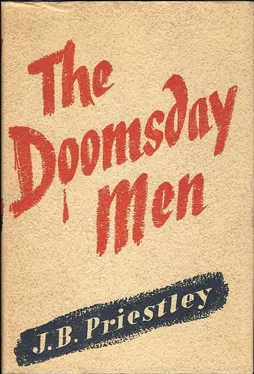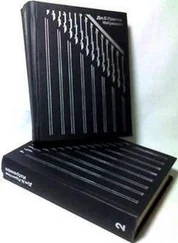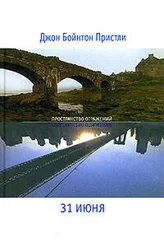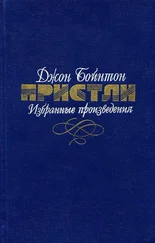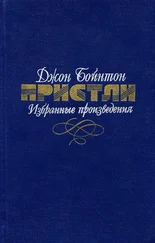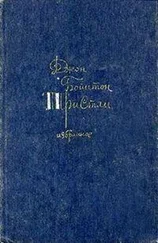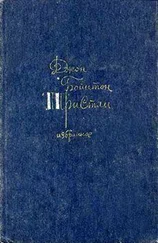He appeared to droop miserably and at the same time contrived to edge a little farther round, nearer the window, and let his hands fall until they were underneath the edge of the table, which was long and fairly wide but not a very massive piece of furniture. “I suppose you know,” he muttered mournfully to the inspector, still drooping, “I’ve been framed.” His hands were gripping the under edge of the table now, and his knees were bent, to give him a good purchase. He talked slowly, miserably, feeling sure that the sound of his voice would have a lulling effect. “I’d met his brother before. He was a professor. He asked me to come down here, and to climb in at the back if he wasn’t here first. So I did, and I was just looking at some notes-”
As his voice trailed along to the end, he summoned all his strength, then heaved the table over, with a crash of books and bag and files and a scattering of papers, so that it fell towards the other two, who instinctively jumped back. Before they could recover and run round, while they were still shouting, he had swung himself out of the window and taken a wild leap into the dark. He went sprawling in the soft earth below, but was soon up and racing down the drive. As he went he could hear shouts behind him. At the entrance a large roadster had been parked. He hesitated a moment, then saw a bicycle leaning against the gatepost. He had not ridden a bicycle for years, but he had had one when he was a boy, and now he wheeled this out, jumped on, not noticing which way he was taking it, and after a few wobbles went sailing down the road at a fair speed. Fortunately, it was big enough for him, and he guessed it to be the property of the police constable. He was adding to his crimes every minute, it appeared, but didn’t give a hoot. What did give a hoot, however, in fact several menacing hoots, was that big roadster, which was now undoubtedly coming after him.
He heard again the cheerful noises of the fair and saw its lights glittering before him. Another turn of the road, and there it was, a few hundred yards in front, just to the left of the road, with most of the village beyond. He decided not to take the chance of riding the full length of the village street on that bicycle; even now one of them might be telephoning from the house to have him stopped; so just before the entrance to the fair, where the crowd began and the hawkers were plying their trade, he dismounted, hastily leaned the bicycle against the low stone wall, looked back down the road and saw powerful headlights coming round the corner, so walked briskly into the fair.
Passing a row of coconut shies and hoop-la and other stalls, he came to a small side-show, labelled Nirobi the Mystic Girl , paid his threepence and quickly dived into the tent, where about twenty people were staring without noticeable enthusiasm at a beery man in a turban that didn’t belong to him and at Nirobi herself, a very thin, dirty-looking, bored girl, who was dancing, in a very perfunctory fashion, with the equally bored and perfunctory assistance of a large snake. Hooker was in no mood, however, to criticise the performance. The point was, it was dark in there; and perhaps by this time the roadster and its policeman were a mile or two farther down the road. Nirobi came to the end of her dance; the snake retired into its basket; and the beery man in the turban announced that for an additional threepence any member of the audience could purchase the wonderful Indian girl’s mystic prophecies. As he held up some smudgy little pamphlets, the mechanical organ outside exploded into song, and a voice was heard saying that another performance by Nirobi was about to commence. This had not lasted long enough. As they went out, Hooker made himself as small as possible, and felt very sorry that he had left his hat behind at the Old Farm. It seemed unpleasantly bright outside, too many lights altogether. And one of the first things these lights showed him, above the crowd only about twenty yards away, between him and the entrance, was a policeman’s helmet.
Hooker edged himself away in the opposite direction, and was lucky enough to run into a fellow who was selling black-and-white paper caps that had large bright yellow cardboard peaks. With one of these monstrosities on his head, and the peak pulled well down, Dr. George Glenway Hooker of the Weinberger Institute of Technology felt a little better. Fortunately, a good many youths were wearing them. Some of the youngsters, who walked round arm-in-arm, screaming, were also wearing false noses and imitation spectacles, and for the first time for twenty years Hooker felt a keen desire to possess a false nose, with or without imitation spectacles. On the other hand, he was convinced that it would not do at all if a man his size and age solemnly enquired, in an American accent too: “Say, where can I buy a false nose?” He moved slowly round with the crowd, a nice silly innocent lot, mostly very young, and began to wonder if after all he had much to worry about. That policeman, whose helmet he had seen, might be on duty here, and not know anything about him. On the other hand, trailing round like this, not knowing who might be ahead of him, at any moment he might come face-to-face with one of his pursuers. And his knees were aching now: it was hard work trying to be several inches shorter than Nature had made you. But then he had another stroke of luck. There, not two yards away, was a basket filled with false noses, imitation spectacles, and sets of celluloid teeth. He treated himself hastily to a very bulbous nose, which had imitation tortoise-shell spectacle frames attached to it; and now behind these he felt there was very little of his former appearance left. His best plan was to have a good look round the fair.
In the centre of the fairground, its masterpiece, was a blaring, shining switchback, in which cars shaped like gilded dragons and vast staring cockerels went whirling round and round and up and down. It stopped for more passengers just as he was making up his mind. Hastily he climbed into the interior of some glittering farmyard monster, and noticed with satisfaction that it would be easier to look out of this curved car than to see, from any distance, who was in it. They began to move, slowly at first, up and down; and there, below, looking about him sharply, was the inspector. No mistake about that: it was the inspector all right. They had guessed he had come in here. Just as the switchback was gathering speed, and before the whole fairground had turned into a whizzing puddle of light, Hooker had time to notice that the inspector was glancing up at the whirling cars. After that he could not tell where the inspector was looking, was not even sure he was still there. Up and down, round and round, they went, with the organ bleating and blaring, the girls screaming, the whole fair a changing scribble of colour and light. And here he was, Dr. George Glenway Hooker, holder of a research fellowship in physics, and just at the very time he had seen himself following Engelfield’s trail into the most distant exploration of deuterons, electrons, neutrons, photons and nuclei , here he was, wearing a black-and-white check paper cap with a bright yellow peak, imitation spectacles and a false nose, careering round and round, like an electron himself, in the middle of a country fair. And, police or no police-by heck!-enjoying it too.
But he had to make sure about that inspector, so every time the switchback stopped, he slumped back into his seat, which was at the back of the car, where the monster’s tail curved round and threw a dark shadow; and he stayed slumped until they were moving fast again. This he did five times altogether, and during the last three rides he was trying to decide what to do. Either he must sneak away across the fields at the back of the fair and risk having to wander about out there for several hours more, or he must try and hide himself in the crowd returning to the main road, in the hope of getting away sooner. And whatever he did, he had made up his mind that he would not return to London but would try and make for Southampton and his ship. That too was a risk, but Engelfield and his brother did not know exactly when he was sailing; and he had too an obscure conviction that they would not try to prevent his sailing, even if they could, and that the fantastic trap they had set for him, which still seemed to him childish and almost idiotic, was simply to pay him out for what they considered his impudent curiosity. But he could think about all that later, he decided; what was worrying him now was how to escape from this neighbourhood. Then he saw, in a flash, that his very best plan was to attach himself to some other person or people, for it would be a solitary young man that the police would be looking for, and probably they would not pay much attention to a noisy group.
Читать дальше
